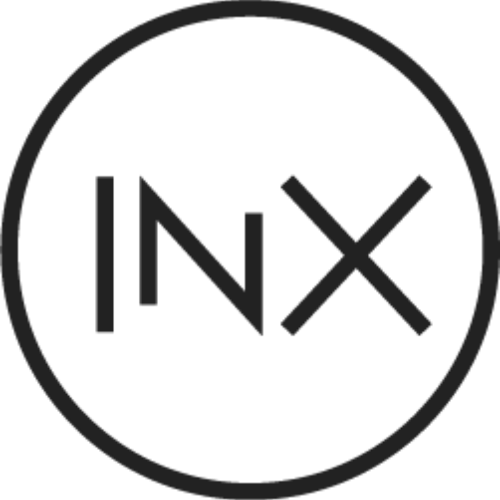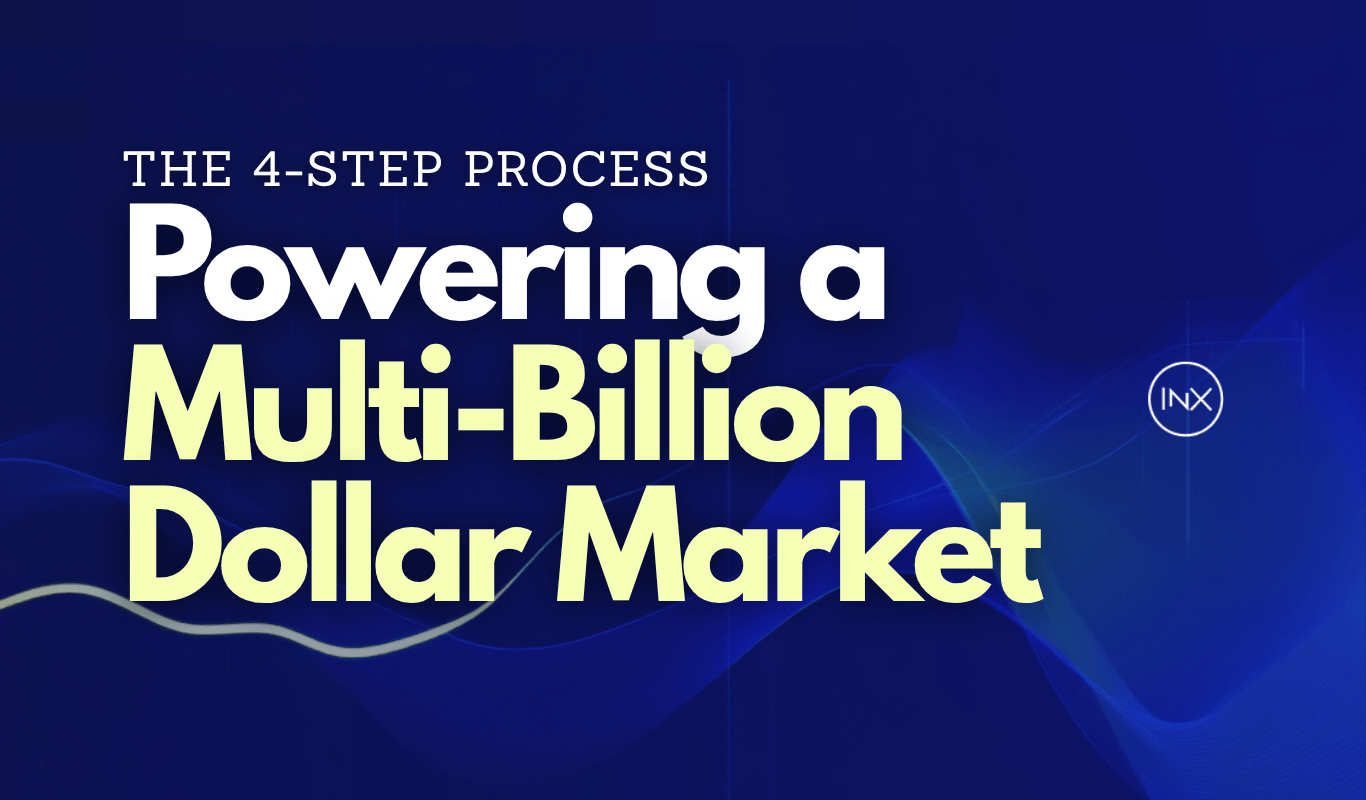As of June 2025, tokenized stocks are worth over $420 million in market cap, an almost 300% increase since the start of the year. Since experts predict that number will reach over $1 trillion over the next couple of years, it is no doubt the fastest-growing RWA category on-chain.
In this article, we explain the stock tokenization process and how regulated platforms like INX ensure regulatory compliance for investors.
What are Tokenized Stocks?
A tokenized stock is an on-chain representation of a share in a publicly listed company that can be traded on blockchains. A tokenized stock mimics the price movement of the original stock and reflects the real-world price. With these tokens, you can buy shares of listed companies without needing to use a traditional brokerage or exchange.
Types of Tokenized Stocks
There are two types of tokenized stocks based on their collateral structure and what they do on-chain:
- Fully-backed tokenized stocks and
- Synthetic tokenized stocks
Fully-backed tokenized stocks are backed with actual shares of a company bought in the physical world. For every time an issuer issues a token on-chain, they buy an equal number of the actual shares, which are stored and managed by a licensed custodian. Some of the fully-backed tokens, like STO tokens, give their holders ownership rights like dividends or redemptions similar to traditional equity ownership.
On the other hand, Synthetic tokens track the price of the stock but do not represent an equivalent amount of underlying real shares. Smart contracts control them and rely on oracles to accurately reflect the price of the stock. Since the underlying assets do not back them, you don’t get dividends, the vote, or a legal claim to the underlying firm.

The difference between the two models lies in the concept of ownership versus exposure. Fully-backed tokenized stocks give legally valid ownership (shares) in the publicly traded company. They are issued under securities laws or exemptions and are regulated by FINRA and/or the SEC.
For synthetic tokens, it is more about getting exposure to stocks without the stress that comes with traditional stocks. They don’t usually offer the legal protection that fully-backed tokenized stocks offer investors.
How Tokenized Stocks Work
1. Asset Custody and Backing
The process begins with the licensed institution purchasing shares of the public company, for example, Tesla or Nvidia. The shares are held in custody, typically in segregated accounts with regulated custodians. In the United States, there is no standard custody license for digital asset securities. Instead, only Special Purpose Broker-Dealers (SPBDs), a regulatory category approved by the SEC, are permitted to custody tokenized securities under strict conditions, like INX.

2. Creation and Issuance of Tokens
Once the shares are acquired and held in custody, the issuing platform mints the equivalent amount of tokens. Tokenized stocks are issued on-chain with token standards that allow programmability, e.g., rules like who can own them and whether they can be redeemed. INX, for instance, has tokenized stocks such as NVDA that are compliant with US regulations. The tokens are made available to verified investors who pass Know Your Customer (KYC) and Anti-Money Laundering (AML) checks.
3. On-Chain Trading and Ownership
Once released, tokenized stocks could be traded on supported platforms like the INX.One marketplace. After the required verification process, investors can fund their accounts with stablecoins or other supported cryptocurrencies and buy and sell these tokenized equities.
Ownership is recorded on the blockchain, replacing the traditional clearinghouses with instant settlement and round-the-clock trading access.
4. Redemption or Conversion
Some tokenized stocks carry redemption rights under which qualified investors can exchange their tokens for the actual underlying stock when they meet certain conditions. Note that not all tokenized stocks offer this feature.
The Tokenization Edge
Tokenized stocks represent more accessible, global, and flexible equity markets without the restrictions of traditional finance. For years, it has been a hassle for investors outside the U.S. or Europe to own U.S. Stocks due to reasons like location restrictions, currency conversion, and access to brokerage.
Tokenization facilitates an easier way to invest in stocks regardless of location or currency restrictions. A Nigerian or Brazilian can now invest in U.S. stocks by buying tokenized stocks of companies without needing a traditional brokerage account. Fractional ownership and 24/7 trading also make the process flexible enough to provide global equity exposure for millions of investors who were excluded before.
Regulation around Tokenized Stocks
The laws surrounding tokenized stocks, particularly in terms of ownership rights and security, are uncertain in some countries, as the regulations surrounding them remain in a gray area. In countries that already have an established securities framework, like the U.S., any asset that mimics or represents the value of a real-world security is classified as a security and is subjected to US securities laws. These regulations detail how such tokens can be issued, individuals who access them, what disclosures are required, and how investors are protected.
CLARITY Act. GENIUS Act. Anti-CBDC.
— INX (@INX_Group) July 17, 2025
The House just voted for structure, not slogans.
Compliance, not chaos.
Markets, not headlines.
For regulated ATS platforms like @INX_Group it’s confirmation. pic.twitter.com/K5aD7LbziT
The problem is usually with enforcing compliance with the legal frameworks. It doesn’t help that it may be hard to track and regulate blockchain-based assets. Regulated platforms solve this challenge by building compliance engines directly into the trading experience. They handle onboarding, KYC checks, transaction monitoring, and custody in a way that aligns with local and international securities law. This means investors can access tokenized assets without worrying about whether the structure is legal or if their rights are protected.
Tokenization is also a bridge between two worlds: the reliability of traditional finance and the flexibility of Web3. By embedding compliance directly into the token architecture, via wallet whitelisting, smart contract permissions, and auditable trails, platforms like INX offer a rare combo: regulatory peace of mind and on-chain functionality. For investors used to the wild, wild west of DeFi, this is a turning point, where you don’t have to choose between security and innovation.
INX offers a clear example of this in practice, standing out as one of the few platforms built to meet these regulatory standards. INX is a SEC- and FINRA-registered broker-dealer and Alternative Trading System (ATS), which allows it to offer and trade digital securities in line with U.S. securities laws. The company also made history by completing the first SEC-registered security token offering (STO) in the United States, raising over $84 million.
If you’re an investor exploring tokenized stocks, trading through a regulated platform like INX helps remove uncertainty. You’re operating in a SEC- and FINRA-registered environment that protects your rights, ensures compliance, and provides transparency throughout the process.
Final Thoughts
For years, investing in blue-chip stocks was limited for many investors due to a lot of reasons. Tokenization changes that by allowing investors worldwide to buy fractional shares using stablecoins, trade them 24/7, all on-chain.
Behind the scenes, the process is simple: a licensed custodian holds the real stock, a token is issued to represent it, and that token can be traded on a regulated platform like INX.
FAQs
What are tokenized stocks?
Tokenized stocks are blockchain-based representations of real company shares, mirroring their market price and enabling 24/7 trading.
How do tokenized stocks work?
They follow a four-step process: asset custody, token issuance, on-chain trading, and in some cases, redemption for the underlying stock.
What is the difference between fully-backed and synthetic tokenized stocks?
Fully-backed tokens are tied to actual shares held by custodians, while synthetic tokens only track a stock’s price without ownership rights.
What are the benefits of tokenized stocks for investors?
They provide global access to equities, fractional ownership, instant settlement, and flexible trading without traditional brokerage barriers.
Why choose INX for trading tokenized stocks?
INX is an SEC- and FINRA-regulated platform that ensures compliance, investor protection, and transparent access to tokenized assets.



